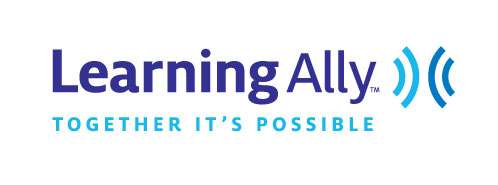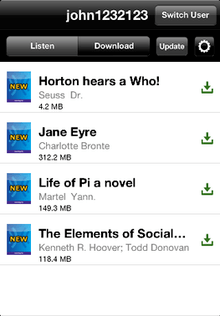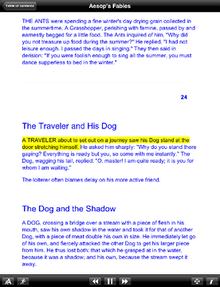Learning Ally
 Learning Ally name and logo | |
| Founded | 1948 |
|---|---|
| Founders | Anne T. Macdonald |
| Type | 501(c)(3) |
| Location | |
Area served | United States |
| Website | http://www.LearningAlly.org |
Learning Ally, which was previously named Recording for the Blind & Dyslexic or RFB&D, is a non-profit volunteer organization operating nationwide in the United States. It produces and maintains a library of educational accessible audiobooks for people who cannot effectively read standard print because of visual impairment, dyslexia, or other disabilities.
Services

Learning Ally provides a wide range of services for individuals with print disabilities such as dyslexia and visual impairments, as well as the people who support them. This includes services for parents such as phone consultations, webinars, support networks and information on specialists and tutors; and services for teachers such as classroom management tools (Teacher Ally), professional development workshops and lesson plans.
Learning Ally also offers a robust digital audiobook library that includes the world’s largest collection of audio textbooks. The library, which in 2015 contained over 80,000 titles, includes a broad variety of specialty and academic subjects, from kindergarten through post-graduate and professional.
Borrowers must provide a certification of their disability, and may borrow titles through an individual membership, through their association with a member institution such as a school, or both. In recent years, approved borrowers had paid no charges or fees for this service thanks to funding provided by the U.S. Department of Education. Since the federal appropriation was eliminated in 2011, Learning Ally began requiring an annual membership fee for individuals, currently $135, with hardship waivers available for those who qualify. Learning Ally Audio software for mainstream mobile devices and Learning Ally's Link software for Mac and PC are available to members free of charge. Institutional memberships are also provided at various fee levels to public and private schools, colleges and universities.
Audiobooks

Textbook and literature titles are digitally recorded by human narrators and produced in downloadable audio files in a specialized format, which allows Learning Ally to respect copyright and allows users to navigate their audiobooks by chapter or page number, set bookmarks, speed up playback, etc. Downloadable audio textbooks can be played using mainstream devices like the iPad, iPhone, and iPod Touch, as well as Android smartphones and tablets, Mac-OS or Microsoft Windows-compatible computers running Learning Ally’s Link software. The audiobooks can also be played back on assistive technology devices like the Plextalk, Humanware Stream, and Intel Reader, to name a few.
Several thousand of the most popular titles in Learning Ally's library are available in VOICEtext format, which features on-screen text-highlighting that is synced with the human audio playback—an advantage for many readers who benefit from a multisensory experience (ear reading and eye reading).
More than 65% of Learning Ally’s digital library includes core-curriculum textbooks for K-12 and college, with extensive collections in science, technology, engineering, and math. Of critical importance for blind readers, Learning Ally audiobooks include descriptions of charts, graphs, and illustrations. It is the largest human-narrated audiobook library in the world for students with disabilities.
Volunteers
Our volunteer force of dedicated individuals nationwide records and help produce over 1,000 titles annually, continuously building Learning Ally's digital audiobook library. Volunteers can help produce audiobooks virtually from the comforts of their own home providing various support services such as, book narration, audiobook quality assurance, participation in social media campaigns, and raising funds and awareness for students who learn differently. We also have a group of subject matter experts who lend their expertise and services by recording textbooks on subjects such as, STEM (science, technology, engineering, and math) law, medical, psychology, and more.
History
Learning Ally didn’t become the world’s largest provider of audio textbooks and literature overnight. Our history is deeply rooted in making sure everyone — no matter the hurdle — can enjoy and comprehend the printed word.
1940s 1948: It all began with Anne T. Macdonald, who envisioned a service for soldiers who had lost their sight in combat. At the time, the newly passed GI Bill of Rights guaranteed a college education to servicemen. Determined to help soldiers who were blind, Mrs. Macdonald led the New York Public Library’s Women’s Auxiliary to record textbooks on vinyl phonograph discs. The organization Recording for the Blind (RFB) was born.
1950s 1950:Demand was so great that RFB incorporated as the nation’s only nonprofit to record textbooks. Mrs. Macdonald then traveled across the country to establish recording studios in seven additional cities.
1960s Reel-to-reel tapes, and then cassette tapes, replaced vinyl discs.
1970s RFB continued to open studio locations across the country.
1980s 1983:The RFB headquarters moved to Princeton, NJ. Operations became computerized, and with the development of high-speed tape duplication, the number of books circulated to our members tripled.
1990s 1990:Electronic text (E-text) provided computer disks for members to use with adaptive computer equipment. 1995:RFB becomes Recording for the Blind & Dyslexic (RFB&D), after recognizing the increased membership of individuals with learning disabilities. 1996:RFB&D developed a pilot program for digital recording to ultimately produce textbooks on CD and other multimedia.
2000s By the 2000s, membership was skyrocketing, as more than 75% of our membership came from individuals with learning disabilities ( from kindergartners to graduate students, as well as working professionals).
2002: RFB&D released DAISY CD (AudioPlus®) digitally recorded textbooks. 2007: RFB&D transitioned to an all-digital Learning Through Listening® Library, and launched the support website at www.LearningThroughListening.org. 2008: RFB&D introduced WMA Downloadable (AudioAccessSM), allowing titles to be downloaded directly to computers and portable media players. 2009: RFB&D introduced Downloadable DAISY (Downloadable AudioPlus®). 2010s During the 2010s, there has been a strong push to advance the technology surrounding our audiobook library, as well our web-based tools.
2010: RFB&D introduced ReadHear by gh, enabling users to access content on both Mac and Window-based computers. 2011: RFB&D makes content accessible on Apple iPhone, iPad and iPod Touch devices. 2011: RFB&D changes its name to Learning Ally to better represent the full breadth of services and the individuals who are members. 2012: Learning Ally introduces Teacher Ally, a powerful new application that simplifies the use of Learning Ally in schools and allows for better tracking of student performance. 2013: Learning Ally introduces new parent support services and enhances its audiobooks with VOICEtext, which allows highlighted synchronized text to accompany the human narration. 2013: Learning Ally makes content accessible on Android devices. 2013: Learning Ally offers professional development for teachers, to help raise awareness of dyslexia among teachers and administrators, how to recognize it in the classroom, and support it through differentiated instruction and other practical classroom strategies. 2014: Learning Ally launches Link, a new and enhanced playback platform for the PC and Mac. 2015: Learning Ally makes audiobook technology for students with disabilities accessible on Google Chrome platforms. Learning Ally Launches Spotlight on Dyslexia - National Online Dyslexia Conference for Parents and Teachers. 2016: Learning Ally launches Link for iOS. Learning Ally Announces College Success Program for Blind and Visually Impaired College Students. 2017: Lexile Level search added as a new feature to the audiobook library. Learning Ally launches Link for Android.
National and Local Award Opportunities
Each year, Learning Ally awards four types of scholarship prizes to students who are recognized for their academic excellence, extraordinary leadership, and service to others; and who have thrived on their education paths thanks in part to their extensive use of accessible educational content and assistive technology provided by Learning Ally. Each award winner has a long list of honors and accomplishments and has graduated with a GPA above 3.0, with most near the 4.0 mark.
- Mary P. Oenslager Scholastic Achievement Awards (SAA)- Since 1959, Learning Ally has honored exceptional students through the privately endowed Mary P. Oenslager Scholastic Achievement Awards (SAA) for college seniors and beyond who are blind or visually impaired. Hundreds of students apply for these prestigious awards each year and are selected by committees of Learning Ally volunteers, board members, parents, educators, donors, and staff.
- Marion Huber Learning Through Listening (LTL) Awards- Each year, Learning Ally honors exceptional students through the Marion Huber Learning Through Listening® Awards, which were instituted in 1991 for high school seniors with learning differences such as dyslexia. Hundreds of students apply for these prestigious awards each year and are selected by committees of Learning Ally volunteers, board members, parents, educators, donors, and staff.
- Winslow Coyne Reitnouer Scholastic Achievement Awards (SAA)- Given to high school juniors or seniors and college undergraduates in southern California.
Explore 1in5
In 2015 Learning Ally launched the www.Explore1in5.org site, a student-driven community hub to drive public awareness of dyslexia.
The site offers resources and information on dyslexia, including:
- Video statements and stories by children and teens describing their dyslexia experiences
- Common misconceptions and myths about dyslexia
- Opportunities for site visitors to contribute their own stories by uploading a video or writing a blog entry
- Ideas and materials to help raise awareness of dyslexia